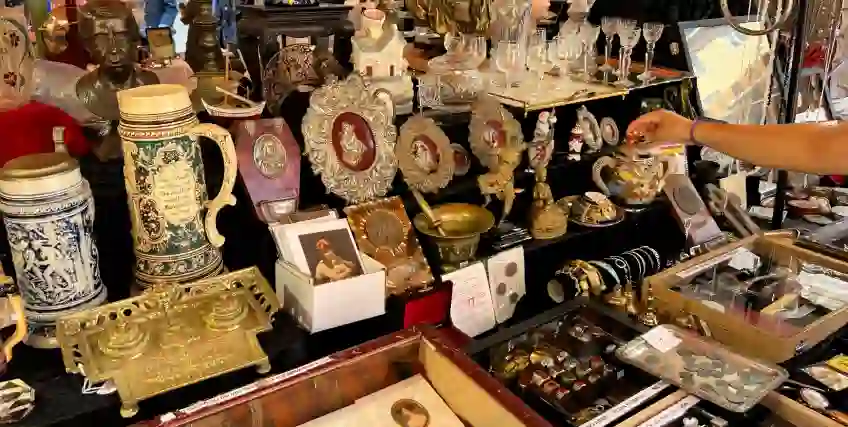Antique Stores Financing: The Ultimate Guide to Funding Your Shop
Sep 02, 2025 | Last Updated on: Sep 03, 2025

Antique stores often face unique financial hurdles. Sales can be unpredictable, inventory is hard to value, and banks may be reluctant to lend. Antique stores financing doesn’t have to come from traditional banks. There are alternative and traditional loan types that can give business owners the flexibility to manage cash flow, grow their business, or cover unexpected costs. Learn why you may need alternative financing, alternative loan options, traditional loans you may qualify for, and how to choose the right lender.
Why Antique Store Owners May Need Alternative Lending
Getting a small business loan from a traditional bank isn’t always easy. Antique stores financing often requires more flexible lending since these businesses rarely fit into neat financial categories. Antique dealers may find themselves pushed toward alternative financing for several reasons:
- Bad credit: Many business owners have personal or business credit scores that don’t meet bank standards. Even a single late payment from years ago can create a barrier. Lenders offering alternative financing options for antique stores are often more willing to work with less-than-perfect credit history.
- Irregular profits: Sales come and go. One month can bring a large sale of a rare piece, followed by weeks of lower activity. This unpredictability makes banks nervous. Alternative financing options are designed to handle uneven income, giving antique dealers more stability.
- Startups: New antique shops often don’t have the credit history or financial records banks want to see. Traditional lenders usually ask for two years of tax returns plus current-year income statements. Startups looking for antique stores financing often need to explore SBA loan alternatives or other flexible sources.
- Seasonal revenues: Some stores make most of their money during the holidays or busy tourist months. For the rest of the year, cash flow may dip. Seasonal borrowing helps cover operating expenses in slower times when antique market traffic is light.
- Hard-to-value inventory: An antique dresser or vintage clock doesn’t fit neatly into a collateral box for banks. Because inventory is tough to appraise, banks rarely count it as security for antique store business loans. That leaves many business owners searching for alternative financing options.
Common Uses for Loan Proceeds
When using antique stores financing, the money usually goes into areas that strengthen or stabilize the business. Antique dealers often use loan amounts for:
- Launching a store: Starting an antique business requires rent, signage, fixtures, and initial stock. Few owners have enough personal savings to cover these costs, which makes antique stores financing or credit lines essential.
- Expansion projects: Adding square footage or opening a second location can help reach more customers. Expansion usually comes with heavy costs, from construction to inventory, and antique stores financing help bridge the gap.
- Buying inventory: Purchasing inventory to stock your store can be expensive, especially when you're unsure when it will sell. Even the most popular items may sit on shelves for days or weeks before a customer pays for them.
- New equipment: Display cases, shelving, lighting, and restoration tools aren’t cheap. Even replacing outdated furniture for customer comfort can add up. Loans help make these upgrades possible while spreading costs into manageable monthly payments.
- Covering seasonal cash flow: During slower months, you still need to pay rent, utilities, and staff. Antique stores financing can keep operations stable until busy seasons return.
- Marketing and online sales: More antique buyers are shopping online. Setting up an e-commerce website, improving digital ads, or investing in social media outreach are all common uses of business financing.
Alternative Financing Options for Antique Businesses
Antique stores financing doesn’t always come from a bank. There are multiple alternative financing options for antique stores that fit different needs. These choices usually come with higher costs, but they balance that with speed, flexibility, and fewer hurdles in the application process.
Merchant Cash Advances
A merchant cash advance (MCA) provides a lump sum upfront that is repaid through a percentage of your daily or weekly sales. For antique dealers with irregular profits, this can feel more manageable since payments rise and fall with revenue. The main advantage is speed. Funds can arrive quickly, making it helpful when you need to secure an estate sale collection quickly. The drawback is cost. Effective annual rates are often higher than with a traditional small business loan, and if your sales slump, repayment obligations can still feel heavy. Antique stores financing through MCAs works best for short-term needs, not long-term investments.
Business Lines of Credit
A business line of credit works like a flexible borrowing account. You’re approved for a maximum amount and only pay interest on what you use. For antique stores financing seasonal operations, this can be one of the most useful tools. It helps cover payroll, utilities, or inventory purchases without locking you into a fixed repayment schedule. Lenders may require a strong revenue record or proof of business stability to determine eligibility, but once open, it’s there when you need it. Some business owners find the peace of mind alone worth it. You don’t always have to borrow, but knowing the funds are available can relieve stress.
Peer-to-Peer Lending
Peer-to-peer platforms connect borrowers with individual investors instead of banks. For antique dealers who struggle with the bank application process, this can be a more approachable route to antique stores financing. Investors on these platforms may care more about your story and plans than about flawless credit history. Loan amounts vary, but they often fall within the same range as smaller business loans. Monthly payments are usually fixed, making it easier to plan around. The tradeoff is that rates can be higher if your credit isn’t strong, and repayment terms are often shorter than a bank loan. Still, for many antique store owners, it’s an accessible way to fund purchases or improvements.
Traditional Loans You May Still Qualify For
Not every antique store needs to go down the alternative path. Some traditional loan types can still work for antique stores financing, especially if you meet eligibility standards. While the process is slower, the benefit is often lower costs, larger loan amounts, and more predictable monthly payments.
SBA Loans
A Small Business Administration (SBA) loan is backed by the government, which makes lenders more willing to approve borrowers with imperfect or limited credit history. These loans often come with lower interest rates and longer repayment terms to qualified applicants, making them appealing for antique stores financing major expansions. Loan amounts can range from a few thousand dollars to millions. The application process is lengthy, requiring tax returns, detailed financial records, and a clear plan. For patient business owners who meet eligibility, SBA loans can provide some of the most competitive rates available.
Secured Credit Cards
If your credit needs rebuilding, a secured credit card can help with antique stores financing. You deposit money upfront, and that amount becomes your credit limit. Over time, responsible use can raise your score, making other antique store business loans more accessible. Some secured credit cards may increase your credit limit or convert to an unsecured card based on how responsibly you manage your account. While this isn’t large-scale financing, it’s an important tool for antique dealers who need to re-establish credit history before pursuing bigger opportunities.
Personal Loans
Some antique dealers turn to personal loans for antique stores financing, especially when the business itself doesn’t have a long record. Approval is based on your personal income and credit history, not the antique shop’s numbers. Loan amounts are typically smaller than those for a small business loan, but they can still cover initial stock, basic renovations, or marketing efforts. Monthly payments are fixed, which provides stability. However, interest rates may be higher if your credit is less than ideal.
Home Equity Loan
If you own property, you may be able to borrow against its value. Home equity loans usually have lower interest and longer repayment periods than unsecured products, making them a more affordable path to antique stores financing. They can provide higher loan amounts than personal loans, which helps fund larger projects. The risk is that your home is the collateral. If your business goes under, you could also lose your home if payments are not met. For some business owners, this is too much exposure. For others, it’s a way to access funding with competitive rates that banks won’t otherwise offer.
How to Choose the Right Lender
Choosing the right antique stores financing means looking beyond the loan amounts offered. Antique dealers should weigh several factors carefully.
- Interest rates and fees: Look at the total cost of borrowing, not just the rate. Some lenders promote competitive rates but offset them with high origination or maintenance fees. Antique stores financing can become expensive if you miss these details.
- Repayment terms: Flexible repayment can make or break cash flow. Match monthly payments to the rhythm of your antique market sales. For example, fixed payments may be tough during slower months, while a line of credit adjusts to your needs.
- Business needs: A merchant cash advance might suit short-term inventory purchases, while an SBA loan could support long-term growth. Antique store business loans should align with how you actually operate your shop, not just what looks attractive on paper.
- Eligibility requirements: Each lender has different standards based on credit history, revenue, and the length of time in business. Check these before applying so you don’t waste time on applications you won’t qualify for.
- Reputation and service: Some lenders specialize in offering small business loan products to retail businesses. Ask how they’ve worked with antique stores financing in the past and whether their service fits your expectations.
Preparing Your Loan Application
The application process for antique stores financing can feel overwhelming, but preparing ahead of time can improve your odds. Business owners should focus on:
- Credit score: Pull your credit history early. If you find errors, dispute them. Pay down credit card balances, make all payments on time, and avoid unnecessary credit inquiries. Even a small bump can improve eligibility and qualify you for better loan amounts.
- Business financial statements: Lenders want to see your recent tax returns and current year profitability. They look for trends to see if your business is growing, stagnant, or shrinking. Accurate books signal that you’re organized and capable of handling business financing responsibly.
- Personal financial statement: Many lenders ask for your personal assets, debts, and income. They want a complete picture of repayment capacity, especially for small business loan approvals that require a personal guarantee.
- Business plan: A clear business plan shows how antique stores financing will be used and how monthly payments will fit into operations. Lenders prefer realistic plans that demonstrate knowledge of the antique market.
- Supporting documents: Be ready with tax returns, bank statements, and legal paperwork. Having these on hand speeds up the application process and shows lenders you’re serious.
The Bottom Line
Antique stores financing can come from multiple sources. Some options are faster and more flexible, like merchant cash advances or peer-to-peer lending. Others, such as SBA loans or home equity loans, may fit long-term goals. What matters most is finding funding that matches your eligibility, fits your needs, and keeps your business running smoothly.
Frequently Asked Questions About Antique Stores Financing
Is owning an antique shop profitable?
The typical profit margin on selling antiques can be three to four times the purchase price; however, profits depend on sourcing, pricing, and effective expense management. Antique dealers who understand their local antique market usually see stronger results.
What sells well at antique stores?
Popular items include furniture, jewelry, collectibles, and décor with nostalgic or practical value. Trends shift within the antique market, influenced by local tastes, changing demographics, tourism, and pop culture.
How do antique stores finance their inventory?
Many use antique stores financing, such as lines of credit or merchant cash advances. These products provide quick access to cash in order to buy inventory for your store.
Are there SBA loan alternatives for antique businesses?
Options include peer-to-peer lending, online lenders, and business credit lines. They’re usually easier to access than traditional SBA loans.
How can I improve my chances of getting approved for financing?
Focus on improving your credit score, prepare clear financial statements, and have collateral to offer, if needed. A simple repayment plan for antique stores financing reassures lenders and strengthens the application process.
Frequent searches leading to this page
Related Articles
Term Loans are made by Itria Ventures LLC or Cross River Bank, Member FDIC. This is not a deposit product. California residents: Itria Ventures LLC is licensed by the Department of Financial Protection and Innovation. Loans are made or arranged pursuant to California Financing Law License # 60DBO-35839




